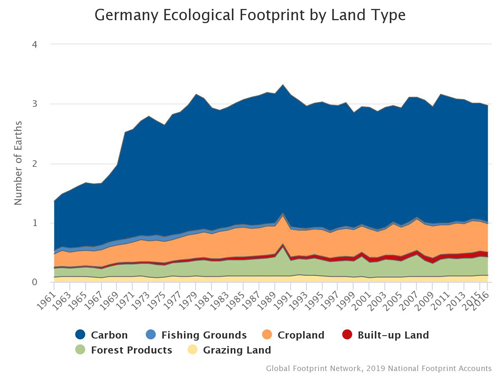Environmental and youth organizations criticize immense
resource consumption of Germany at a value of equivalent three earths
Germanwatch, INKOTA, BUNDJugend, Naturschutzjugend, FairBindung and Global Footprint Network
From 3 May, Germans will be living on credit, ecologically—Germany’s Overshoot Day marks the point in the year when the world’s annual renewable budget would be used up if the entire world population lived like German residents. The day is calculated annually by Global Footprint Network who measures how much productive land and sea area is needed for food, fiber, wood, roads and buildings, as well as for the absorption of CO2 from burning fossil fuel. With its per capita consumption and emissions, Germany is in the top quarter of all countries and thus contributes significantly to global overuse. “Both in terms of climate protection and resource use, the German government is acting as if there were no tomorrow. But we will not simply give up our right to the future. It is only logical that our generation takes to the streets every Friday and demands a quick and clear change of course from politicians,” comments Kira Heinemann from the Executive Board of BUNDjugend.
When calculating Germany’s Overshoot Day, two variables are compared: on the one hand, the biological capacity of Earth to renew resources and absorb waste emissions, and on the other hand, the total demand for usable natural resources and areas such as forests and farmland that people need for their current way of living and for economic activities. “If everyone lived as they do in Germany, we would need three Earths. This waste of our resources must stop. We have a responsibility to future generations. A rethinking and a change of our behavior to a sustainable way of life must take place now”, emphasizes Jan Göldner, from the federal board of (Naturschutzjugend im NABU). By way of comparison, the entire world population needs about 1.7 Earths to meet the material needs of humanity today. “Since we have only one Earth, this overuse leads to a progressive deterioration of the soil and forest quality and to a high-risk climate crisis. We are part of a dangerous Ponzi (or pyramid) scheme: we take resources of the future to feed today’s economy. It’s like building our own trap,” says Dr. Mathis Wackernagel, founder of Global Footprint Network.
In Germany, energy supply and transport in particular contribute to overshoot through their high CO2 emissions. “The decline in CO2 emissions in Germany in 2018 was caused by a mild winter, higher CO2 prices in emissions trading and the closure of coal-fired power plants,” says Julia Otten of Germanwatch. “A stable reduction in emissions at double speed would be necessary. In all sectors, a reorientation is needed with binding targets and a rising CO2 price. For this we need a climate protection law.”
With its enormous land requirements for meat production and high greenhouse gas emissions, industrial agriculture is contributing to Germany’s large Ecological Footprint. “People in lower income countries suffer most from our way of doing business: Farmers there are particularly hard hit by extreme weather events as a result of climate change. Cyclone Idai has destroyed entire harvests and thus the livelihood of the population in Mozambique,” says Lena Michelsen of the development organisation INKOTA. “But also in Germany the number of cases of damage is increasing significantly.”
“We must ask ourselves at whose expense our resource-intensive lifestyle in Germany is at – and whether there are not more forms of solidarity to satisfy our needs,” says Kristina Utz of the growth-critical organisation FairBindung.
The Earth Overshoot Day is calculated every year by Global Footprint Network. On the one hand, it is calculated for each country – as it is now for Germany. On the other hand, Earth Overshoot Day refers to the worldwide use of resources. Last year it took place on 1 August.
Background: For data on all countries: data.footprintnetwork.org
More information on Earth Overshoot Day can be found at www.overshootday.org
For the German version – click here.




